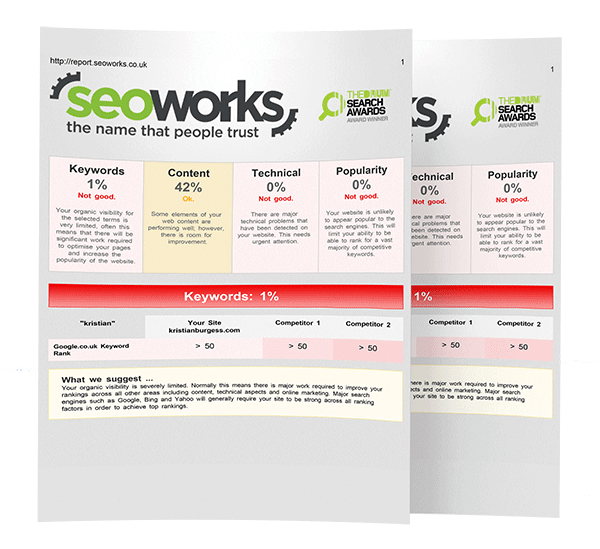Local SEO: A Beginner’s Guide
Local search is a powerful technique for small businesses. If you aren’t optimised for local search, you could miss out on potential customers looking for your type of business in your area.
To help you optimise your business for local SEO, we have put together this beginner’s guide to local SEO which will cover what it is, why it is important and how you can optimise for local search.
Local SEO Basics
What is Local SEO?
Local SEO is a strategy that helps improve search engine visibility for local businesses. Any business with a physical location or serves a geographical area can benefit from local SEO best practices.
Common local SEO practices include:
- Finding local keywords
- Optimising your Google My Business profile
- Creating locally relevant content
Why is Local SEO Important?
Optimising for local search is important for businesses who serve specific towns, cities, or regions. It allows users to find information about your local business quickly and easily.
How does Local SEO Work?
On top of the usual ranking factors, Google’s local search algorithm uses three factors which determine local ranking:
- Relevance = How well your business matches with a user’s search query.
- Distance = How far your business is from the location term used in the search query.
- Prominence = How well-known your business is compared to competitors.
Google can show two types of search results for local searches, which are ‘map pack’ results and organic ‘blue link’ results. You can rank on both of them.
Map Results
The map results are at the very top of the local search results and display a SERP feature highlighting the top local businesses against the map.
Organic Search Results
The organic search results are the blue links which appear underneath the map results when a local search has been made.
Who Benefits from Local SEO and Why?
All businesses which interact with and service customers in a specific location can benefit from local SEO.
Here are a few examples:
Law Firms
A great benefit of local SEO is businesses can include a call button directly on their Google My Business profile. Therefore, when a potential client has been in an accident, they can search for a law firm near them and be able to call them within a matter of minutes.
Doctors & Medical Practices
Most people don’t want to travel outside their location to go to the doctors. Therefore, when a user searches for a medical practice near them, you would want your business to benefit from local SEO.
Local Keyword Research
Conducting local keyword research is an essential step to take and will help you map out your content for your business. Begin by researching what you already rank well for, what your competitors rank well for vs what you don’t, and any further opportunities you can gather for your local business.
If your research has a lot of keywords without a location, you can add the location on to them. They may have a lower search volume than the generic keyword, however, potential users in that area are more likely to search for these local queries. You can also have a look at the Google Autocomplete feature, which involves users searching for a specific query and Google predicting what else they may type afterwards. These predictions depend upon where a user is based, however, it could help you to discover valuable keywords for local SEO.
Although, be mindful of the local intent behind what you would like to rank for. Local intent means that searchers are looking for something nearby, and therefore the map results will show up. If this isn’t the case for your services, it isn’t a local SEO opportunity.
Local SEO Ranking Factors
Optimise Your Google My Business Profile
Having a well-optimised Google My Business profile is an excellent way to show off your business in local search. It will appear at the sidebar space of a local search, or through the map results.
There are a number of ways you can optimise a Google My Business profile, we recommend:
- Creating and verifying your Google My Business account.
- Adding relevant NAP (Name, Address, Phone Number) information and ensuring consistency throughout your listing, website & social media pages.
- Including a business description.
- Utilising the photos and posts features.
- Encouraging your customers to share reviews – generally, the more positive reviews you have, the more authentic and authoritative your business appears to Google.

Having a Google My Business profile is beneficial for local SEO, but also the overall user experience for potential customers to find you. They want to know your contact information, operating hours, and star reviews.
Download our free guide to optimising Google My Business:
On-Site SEO
Localised Content
Once you have established your local-based keywords, you can now map them to the relevant pages. When writing your content, remember to include the key term and the location in the metadata and the header 1 tag.
If you have more than one location to target, creating multiple location pages for users in different regions is a great way to gain attraction further afield.
FAQs
Once you have created your localised content, don’t forget about the basics too! Frequently asked questions are an excellent way to gain a featured snippet for your local based keywords.
Local Business Structured Data
Using Schema Markup Generator, you can add structured data to your local business. When users search for a type of business, they may see a carousel of businesses related to that query, show up. By using local business structured data, you can tell Google all about your business, opening hours, different services, and reviews.
Local Link Building
Gain Local Listing Links
Local listings are mentions of your business’ NAP (Name, Address, Phone Number). They help users find your business on other search engines such as Bing, Yahoo, and Apple Maps. These types of links are deemed less important, however they may still help your business to rank locally.
Get Featured on Local List Posts
‘Best of’ lists are available for almost every product or service, no matter how obscure. Therefore, getting your local business featured on these relevant lists are a great idea to get more users onto your website, as chances are if they see you have been featured they are likely to visit, especially if they have searched for a term like ‘best _ in _’. It also gets you a backlink, which help improve your domain authority score.
Tracking a Local SEO Campaign
People divided by a few miles might get different results for the same query and with proximity being an important factor, it is hugely beneficial to be able to manage the keyword performance in the exact location.
This can be done in SEO Monitor:
- Navigate to your SEOMonitor campaign and click on the ‘UK’ dropdown.
- Click on ‘Add a New Tracking Location’.
- Search for a specific Region, County, or City.
- Add location and then copy across your local-based keywords into this folder.


Start Harnessing Local SEO
Now that you have a better understanding of Local SEO and how Google ranks local search results, you can begin to put together a Local SEO strategy. It is an important factor for your local business to help users find you when they search online.
You can find out more about our SEO services here, or some of our SEO successes here.

Emily specialises in SEO training, has a keen eye for Local SEO, and is obsessed with organisation.

